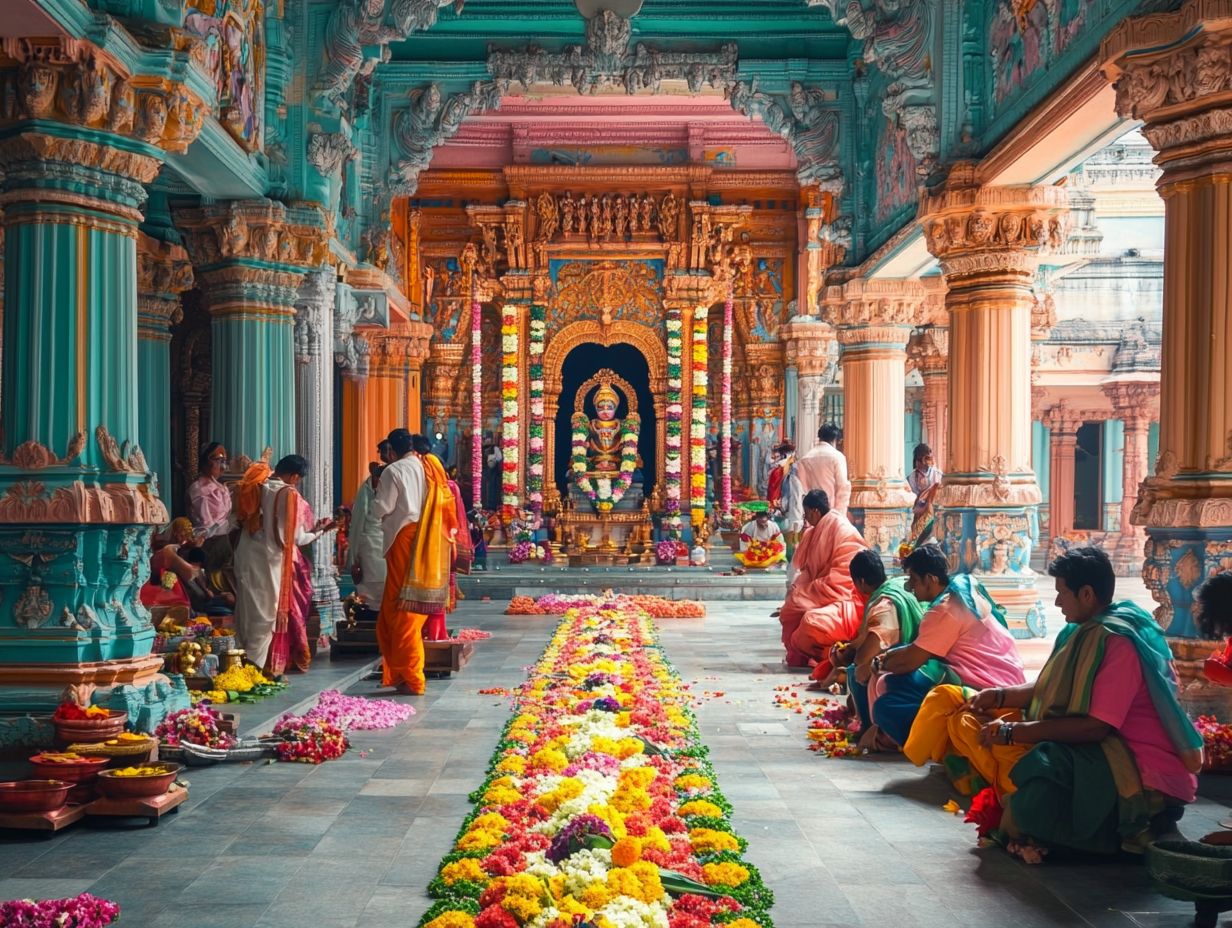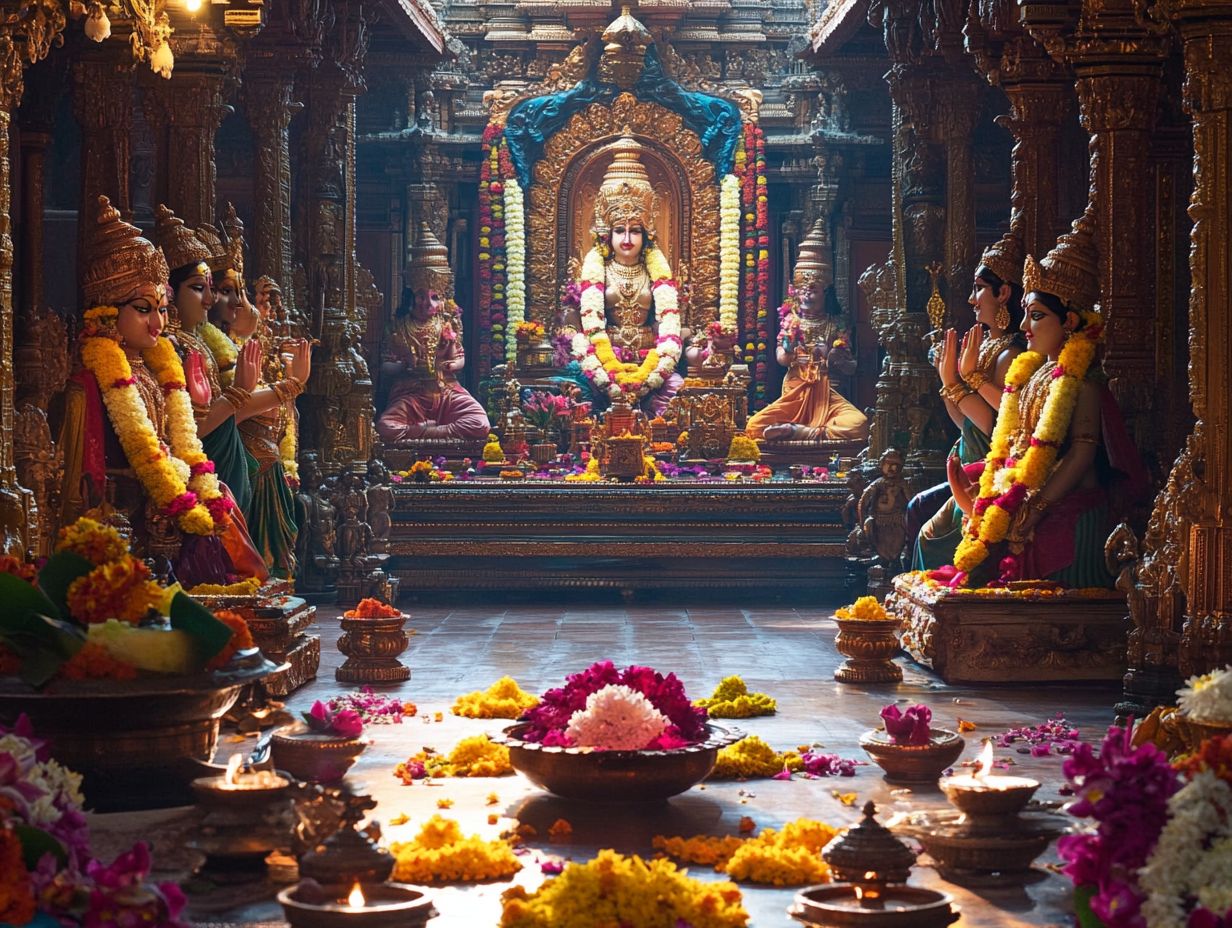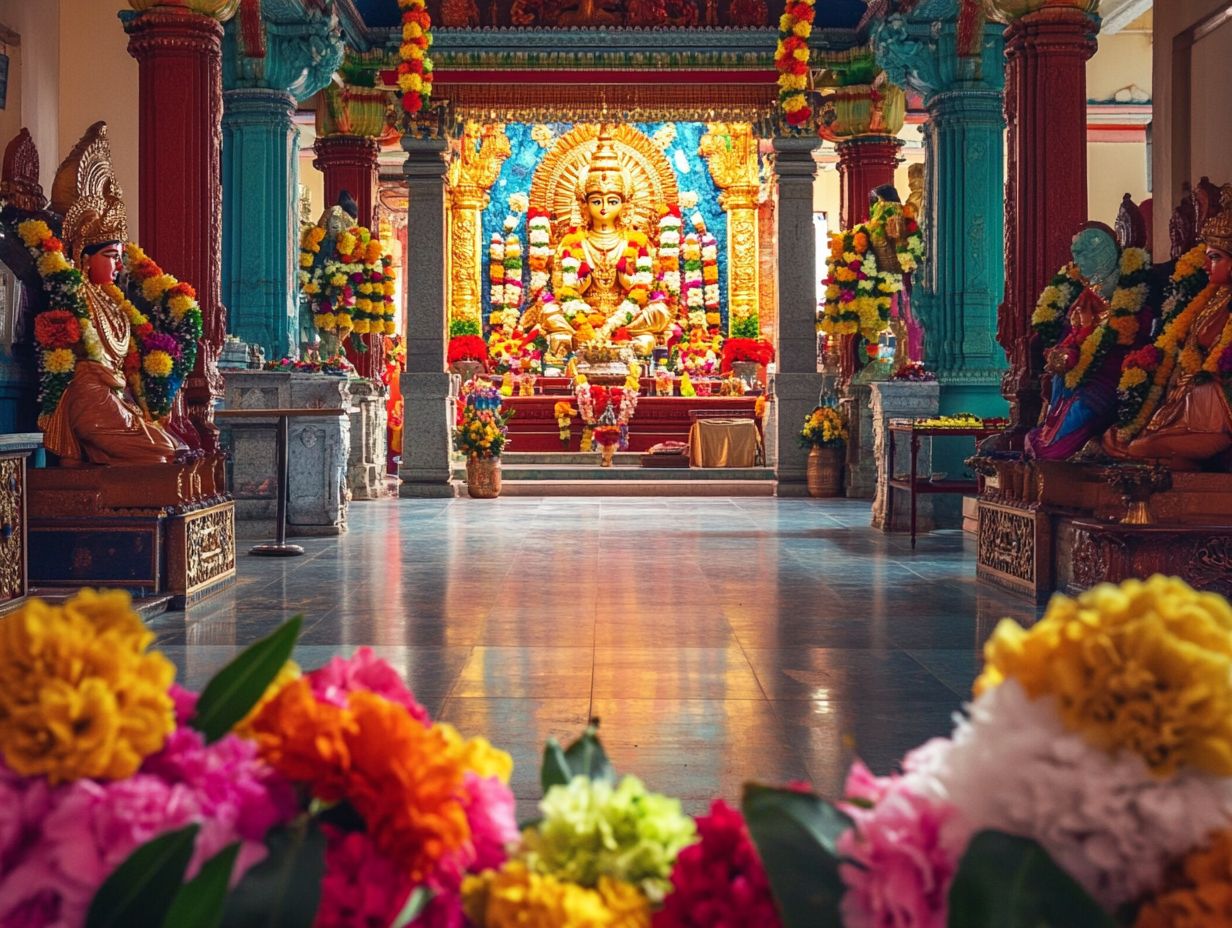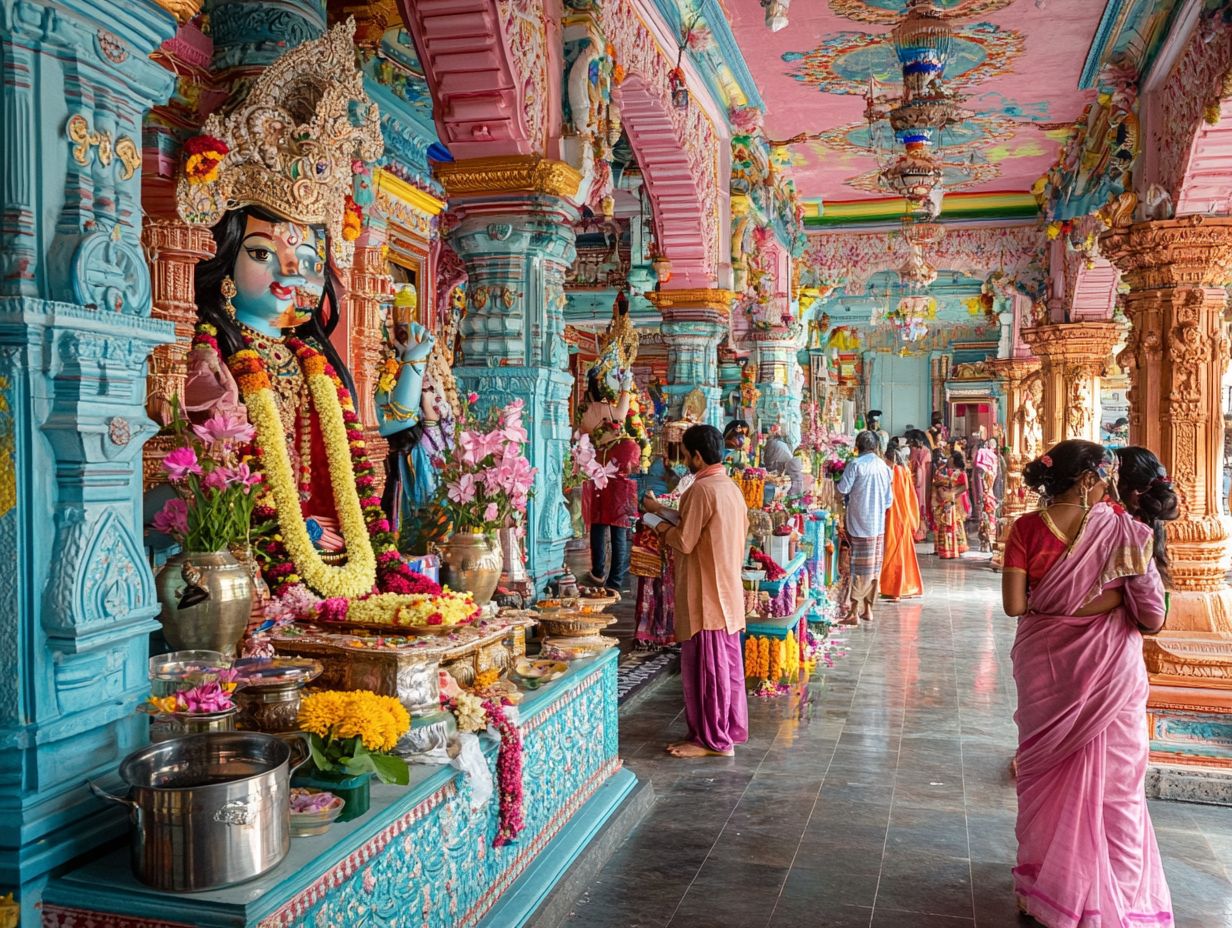Is Idol Worship Allowed in Hinduism?
Idol worship represents a fascinating and intricate dimension of Hinduism, prompting a myriad of inquiries regarding belief, practice, faith, and spirituality.
With its diverse manifestations and deeply entrenched traditions, idol worship acts as a vital conduit, connecting devotees to the divine and fostering a deep spiritual connection.
This exploration delves into the myriad beliefs surrounding idol worship in Hinduism, addressing its significance, various forms, and the arguments made against it from different theological perspectives.
It investigates how idol worship fosters personal connections with the divine and considers the perspectives offered by various scriptures, such as the Vedas, Upanishads, Bhagavad Gita, Ramayana, and Mahabharata, and leaders regarding its role in contemporary practice.
Through this examination, the layers of this captivating spiritual expression, including the roles of deities, icons, and religious symbols, will be thoughtfully unraveled.
What is Idol Worship?

Idol worship, a foundational practice in Hinduism and other religions like Jainism and Buddhism, encompasses the veneration of deities through an array of rituals, offerings, and prayers, granting worshippers a tangible pathway to connect with the divine. This practice is anchored in the belief that idols or icons serve as divine representations, embodying distinct aspects of God, thereby facilitating a profound spiritual connection and nurturing a deep sense of faith among practitioners.
Through the acts of sanctification and ritual, devotees partake in puja and bhakti, which not only reinforces the cultural significance of idol worship in their personal lives but also within the expansive realm of Hindu spirituality.
What are the Beliefs of Idol Worship in Hinduism?
The beliefs surrounding idol worship in Hinduism are intricately woven into its scriptures and religious texts, embodying a rich tapestry of theism and polytheism. Within this framework, devotees discover solace in their personal deities and the various avatars that represent divine entities.
This system underscores the importance of worship practices that facilitate the expression of devotion and the nurturing of a spiritual bond with the divine, reflecting both traditional beliefs and modern practices.
In this context, idol worship serves as a vital conduit through which individuals articulate their faith, uphold moral values, and strive for enlightenment, reflecting the diversity of sects and traditions that enrich Hinduism.
What are the Different Forms of Idol Worship in Hinduism?
In Hinduism, idol worship manifests in a multitude of forms, each enriched with its own distinct rituals and puja practices that invite worshippers to engage in both communal and personal devotion, thus creating a rich tapestry of religious expression and spiritual connection.
These various forms often incorporate icons and religious symbols, which serve as conduits for spiritual connection and divine representation. Practices can vary significantly across regions, sects, and traditions, reflecting the cultural diversity that is intrinsic to Hindu worship.
For example, some devotees may gravitate toward elaborate temple ceremonies filled with the sounds of traditional music and vibrant dance, while others might favor simple home-based rituals that foster a peaceful, reflective atmosphere for meditation and prayer.
The communal dimension of worship becomes particularly evident during festivals, where large gatherings transform local spaces into lively arenas of devotion, showcasing intricate idols that are paraded through the streets.
Certain sects highlight specific deities and their associated festivals, further enriching the landscape of idol worship and nurturing a profound sense of identity and belonging among practitioners, emphasizing both individual and collective worship.
What is the Importance of Idol Worship in Hinduism?
Idol worship occupies a central role in Hinduism, serving as a foundational aspect of spirituality that cultivates a deep emotional connection between worshippers and their deities. This practice fosters a profound cultural significance and a robust sense of community identity.
It enables individuals to articulate their devotion while simultaneously playing a vital role in the preservation of the religious traditions and philosophical discussions, including those in devotional literature, that shape the Hindu experience.
Through participation in rituals and ceremonies, worshippers embark on a spiritual journey that enriches their comprehension of dharma, karma, and the fundamental essence of divine love.
How Does Idol Worship Connect Hindus to the Divine?
Idol worship serves as a profound connection for Hindus to the divine, functioning as an essential bridge for spiritual engagement. Through elaborate rituals and offerings, devotees are able to interact intimately with their personal gods, a connection that is deepened by the ritualistic acts of puja and meditation. These practices cultivate an atmosphere steeped in sanctity and devotion, allowing worshippers to experience divine grace and emotional fulfillment. Such rituals embody the essence of faith that is integral to the Hindu spiritual journey.
Participation in these sacred rituals fosters a sense of belonging and community support, reinforcing emotional ties to their faith. For many, these rituals become a canvas for personal expression, offering moments of reflection and prayer that ultimately strengthen their bond with the divine.
The act of idol worship elevates the mundane to the extraordinary, inviting a tangible sense of the divine into everyday life. Devotees often report experiences of clarity and tranquility during these practices, which further solidify their belief in the transformative power of divine grace.
Through this intimate engagement, personal gods transcend mere symbolism, emerging as cherished presences that illuminate and guide their spiritual paths, embodying both divine manifestation and divine representation.
What are the Arguments Against Idol Worship in Hinduism?

Arguments against idol worship in Hinduism frequently revolve around theological concerns, particularly the compatibility of idolization with monotheism and theism. Critics contend that the act of venerating idols may detract from the worship of the one true God.
They assert that idol worship can be perceived as superstitious or as an attachment that diverts individuals from establishing a direct relationship with the divine. Such debates underscore the philosophical tensions inherent in Hinduism, illuminating the ongoing discourse about worship practices and their implications for spiritual fulfillment.
Does Idol Worship Go Against the Concept of One God in Hinduism?
The question of whether idol worship contradicts the concept of one God in Hinduism serves as a central theme in ongoing sectarian and theological debates, with diverse beliefs influencing the understanding of theism and monotheism within the religion.
This intricate discussion sheds light on the broader implications of perceiving the divine in ways that resonate with various communities. For numerous practitioners, idols offer a tangible connection to spirituality, fostering personal devotion and emotional engagement that more abstract notions of divinity often fail to provide.
Conversely, some contend that a reliance on physical forms may obscure the perception of the infinite and formless essence of the divine, potentially leading to misconceptions regarding the nature of worship and the singular God. These differing interpretations not only enrich the intricate tapestry of Hindu practice but also provoke essential inquiries about the effects of divine representation, the role of personal beliefs in shaping religious experiences, and the delicate balance between individual expression and communal identity.
Is Idol Worship Seen as Superstitious in Hinduism?
Idol worship often finds itself scrutinized by certain factions within Hinduism, who critique it as an act of superstition. They argue that reliance on physical representations of the divine may undermine the ethical and philosophical underpinnings of faith. Critics contend that such practices risk diverting attention away from the personal and direct spiritual connection that should ideally be fostered between the individual and the divine. This viewpoint invites a more profound exploration of the ethics and motivations that underpin idol worship and its function within the expansive Hindu belief system.
Some assert that elevating an idol above personal contemplation might unintentionally lead practitioners to prioritize rituals over authentic spirituality. This concern arises from the belief that tangible objects can serve as distractions, causing individuals to conflate spiritual understanding with mere physical presence at ceremonies.
In an era increasingly centered on personal ethics and authenticity, questions emerge regarding how idol-centric practices align with an individual’s pursuit of deeper truths. Advocates of these perspectives champion a spiritual practice that promotes self-reflection and nurtures an intimate connection with the divine one that transcends material representations.
Is Idol Worship a Form of Attachment in Hinduism?
Philosophical debates within Hinduism often question whether idol worship may signify an attachment that impedes true spiritual progress, suggesting that such practices could tether devotees to the material realm rather than the transcendental. This perspective underscores the inherent tension between devotion to physical forms and the quest for inner peace and enlightenment pursued through spiritual practices. Consequently, this discourse prompts vital inquiries into the effectiveness of prayers and the nature of divine love in relation to idol worship.
As practitioners navigate these intricate complexities, they frequently find themselves reflecting on the balance between their reverence for divine representations and the deeper, more personal connections that can lead to ultimate realization. In exploring the nuances of attachment, they might recognize that idol worship can function as both a bridge and a barrier to heightened consciousness. While devotion through tangible symbols may initially ignite a spiritual journey, it can also inadvertently divert one’s focus from internal exploration, complicating the path to enlightenment.
Thus, grasping this duality becomes essential for advancing one’s spiritual practices and reshaping one s approach to the divine.
What are the Benefits of Idol Worship in Hinduism?
The benefits of idol worship in Hinduism are numerous, extending beyond individual spiritual fulfillment to significantly enhance communal harmony through shared worship practices.
Engaging in idol worship offers practitioners a structured method of meditation, cultivating inner peace and fostering a deeper spiritual connection with their chosen deities. These practices not only instill a sense of belonging but also strengthen community ties, underscoring the cultural significance of rituals and the effectiveness of prayers in realizing spiritual aspirations.
How Does Idol Worship Help in Meditation and Concentration?

Idol worship plays a significant role in enhancing meditation and concentration, as the accompanying rituals and offerings establish a sacred environment that elevates focus and deepens spiritual connection. Through their engagement with divine representations, worshippers cultivate a richer understanding of their spiritual journeys while experiencing profound divine love and grace.
This harmonious blend of ritualistic acts and meditative practices not only enriches individual spirituality but also strengthens the communal aspects of worship.
When devotees immerse themselves in these venerable ceremonies, they unlock layers of significance that extend far beyond mere physical artifacts. Each ritual, from the gentle lighting of a diya to the rhythmic chanting of mantras, acts as a conduit for communion with the divine, aiding individuals in cultivating mindfulness.
As they explore these practices, many discover that their immersion in idol worship fosters a state of tranquility, creating an atmosphere conducive to deep reflection. The collective nature of these rituals enhances the sense of belonging, facilitating a shared experience of divine love that resonates deeply within the hearts of all participants.
Does Idol Worship Help in Building a Personal Relationship with the Divine?
Idol worship plays a pivotal role in enabling individuals to cultivate a personal relationship with the divine, serving as an accessible conduit for expressing devotion and forging emotional bonds. Engaging with idols allows worshippers to articulate their thoughts, prayers, and aspirations, thereby deepening their spiritual journey and enhancing their connection with their personal deities. This relational aspect highlights the importance of idol worship within the broader tapestry of Hinduism and its diverse sects.
Through the tangible presence of idols, individuals discover a focal point for their emotions, fostering a sense of intimacy and personal connection that often eludes them when confronted with abstract concepts. As devotees kneel before their idols, a surge of devotion often envelops them, inspiring a more profound understanding of their faith and purpose. This journey transcends mere rituals or ceremonies; it evolves into a transformative experience where each whispered prayer and every offering made reflects a heartfelt longing for divine grace.
In this manner, idol worship transcends a simple act of reverence, becoming a profound dialogue that nurtures the soul and enriches one s spiritual path.
Is Idol Worship Allowed in Hinduism?
The inquiry into the permissibility of idol worship within Hinduism prompts thoughtful consideration, as a multitude of scriptures both support and challenge the practice, resulting in diverse beliefs across sects.
Numerous Hindu texts affirm the sanctification of idols as valid manifestations of devotion and faith; however, certain authorities raise questions about the legitimacy of these practices, illustrating the intricate tapestry of interpretations that characterize the religion.
This ongoing discourse significantly influences the contemporary understanding of idol worship within Hindu society.
How Do Different Hindu Scriptures View Idol Worship?
Different Hindu scriptures present a spectrum of perspectives on idol worship, with certain texts endorsing the practice as a legitimate form of devotion, while others advocate for a more abstract understanding of the divine. This diversity within religious texts reflects the intricate beliefs surrounding idolization, emphasizing the critical importance of context in the practice. Such plurality underscores the significant role that scriptural interpretations play in shaping both individual and communal approaches to worship.
For instance, texts like the Bhagavad Gita emphasize the internal connection with the divine, suggesting that true devotion transcends mere physical representations. In contrast, texts such as the Puranas delve into the rituals surrounding idol worship, articulating how these practices can cultivate a personal connection with deities.
This multifaceted perspective illustrates that while some believers may derive profound meaning from physical representations through idols, others champion a more philosophical approach. Ultimately, the varying perspectives on idol worship illuminate the richness of the Hindu tradition, encouraging followers to explore and refine their personal beliefs and understandings of devotion.
What Do Hindu Gurus and Saints Say About Idol Worship?
Hindu gurus and saints have historically provided profound insights into the practice of idol worship, highlighting its significance in cultivating spiritual connection and devotion. They recognize the importance of discernment in worship practices, reflecting a wide spectrum of beliefs. Their teachings advocate for the value of rituals in nurturing faith while simultaneously encouraging followers to pursue a deeper understanding of spirituality that extends beyond mere idolization.
This guidance acts as an essential compass for worshippers as they navigate the complexities of devotion in contemporary contexts.
These spiritual leaders remind adherents that idol worship can serve as a powerful tool, acting as a tangible representation that helps anchor the divine in the hearts and minds of the faithful. Within this framework, the practice evolves beyond the simple act of bowing before a statue; it becomes a dynamic dialogue between the devotee and the divine.
Gurus often emphasize that genuine worship stems from authentic devotion, urging believers to engage with their chosen deities through love, respect, and contemplation.
By embracing such teachings, individuals can enhance their spiritual lives while maintaining a crucial balance between devotion and an understanding of the greater cosmic truths.
Is Idol Worship a Personal Choice in Hinduism?

The practice of idol worship in Hinduism is often seen as a personal choice, embodying the diverse beliefs and spiritual practices that vary among worshippers and communities. This autonomy enables individuals to engage with their faith in a way that aligns with their understanding of devotion and spirituality. As a result, this perspective cultivates a rich array of worship methods and rituals, enhancing the cultural tapestry of Hinduism.
While some individuals may regard idol worship as a profound expression of reverence, others might approach it with skepticism or offer alternative interpretations. Such perspectives are frequently shaped by family traditions, regional influences, and personal experiences, all of which contribute to a collective sense of community and belonging.
Within congregational settings, believers often find inspiration and affirmation through shared rituals, which enhance their spiritual journeys and reinforce their beliefs. This interplay between individual choices and communal values illustrates the dynamic nature of faith, as devotees navigate their personal convictions while engaging with the broader societal fabric of Hindu worship.
Frequently Asked Questions
Is Idol Worship Allowed in Hinduism?
Yes, idol worship is allowed in Hinduism. In fact, it is a common and accepted practice in Hinduism.
Why do Hindus worship idols?
Hindus worship idols as a physical representation of the divine. It helps them connect with the deity and aids in their spiritual practice.
Are all Hindus required to worship idols?
No, not all Hindus are required to worship idols. Some Hindus may choose to worship a formless, abstract concept of God instead.
Are there any rules or guidelines for idol worship in Hinduism?
Yes, there are guidelines for idol worship in Hinduism. These vary depending on the specific tradition or sect, but generally, idols are to be treated with respect and kept in a clean and sacred space.
What is the significance of idols in Hinduism?
Idols in Hinduism are seen as a physical manifestation of the divine, allowing devotees to have a tangible object to focus on during worship and meditation. They also serve as a reminder of the deity’s presence in their lives.
Are there any criticisms against idol worship in Hinduism?
Yes, there are some criticisms against idol worship in Hinduism, mainly from those who view it as an idolatrous practice. However, many Hindus see it as a form of devotion and a means of connecting with the divine.
